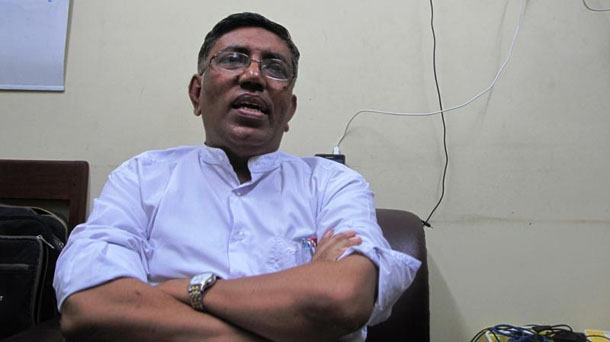RANGOON — Former political prisoner Yan Naing is a politician and activist from the Irrawaddy Delta. A member of Burma’s Muslim minority, he was a second generation supporter of the National League for Democracy.
As a campaign manager for an NLD candidate in the 2012 elections, he faced some resistance from inside the party. He left the NLD before the 2015 elections, in which the party failed to field a single Muslim candidate amid rising anti-Muslim and nationalistic rhetoric in Burma.
Yan Naing, a lawyer by profession, joined the United National Congress (UNC), a historically Muslim party, and ran in Thingangyun constituency for a Lower House seat. Like all his fellow UNC candidates, as well as many other non-NLD candidates, he lost.
He spoke again to Myanmar Now about his thoughts on the future of Muslims in Burma as the new NLD government prepares to take office.
Are you concerned that there will be less discussion on the rights of Muslims in parliament since no Muslim candidate was elected in the Nov. 8 elections?
When it comes to discussing the issues concerning Muslims, perhaps the NLD will take up that responsibility. But they would only be able to say what they’ve heard, as they wouldn’t be able to feel exactly like a Muslim would.
What is the view of Muslims on the political parties that did not field Muslim candidates?
A lot of Muslims feel very sad about this, especially that the NLD didn’t field a single Muslim candidate. But most of the Muslims voted for the NLD anyway in order to get democracy. They still have a lot of confidence in the NLD.
Communal and religious conflicts have broken out in recent years in Myanmar. Some in authority seem to favor nationalistic groups. Do you think the next government will challenge this?
It is good to protect your own religion. But I think it is not appropriate to misunderstand, attack and discriminate against other religions, especially Islam. Some accused the NLD of favoring Muslims and called them all sorts of names. I think the NLD needs to work hard to negotiate with these people. The new government needs to build up mutual trust among the people in different faiths.
There may be some people within the party who have a misunderstanding of Muslims. What do you think?
It depends on Aung San Suu Kyi. She needs to manage this. Our Muslim groups and parties also need to hold discussions with the NLD. In terms of my personal experience, there were people who objected to my appointment as the campaign manager of NLD in Myaungmya Township during the 2012 by-election. It was a shock—the people who protested included those who were close to me. It seems like they didn’t want Muslims taking up important roles in the NLD.
Which kind of laws do Muslims think they will need to ensure citizen rights in the new government?
It is important to align Burma’s citizenship law to meet international norms. The government needs to reform procedures of the immigration department which mention ethnicity and religion to ensure citizen rights for all nationalities. My family is of Indian descent and the third generation here. My grandmother was a Burmese citizen. Some say the colonial era law discriminated against Burmese nationals and favored Muslims, but it is unfair to exact revenge on us now. Today’s Muslims in Burma are (often) descendants of Muslim men and Myanmar women. I think we need to make the new government understand this.
During the post-election period, some nationalistic groups used anti-Muslim rhetoric and claimed the Islamic flag was the flag of ISIS. Do you think this could lead to conflict?
Every Muslim home has the words of the prayer to Allah in Arabic. These words are misused by ISIS. Just because you have these holy words doesn’t make you ISIS. Our Muslim community has the responsibility to explain this. Islamic leaders in Burma have issued statements declaring that ISIS is misusing Islam. We don’t believe in ISIS or al Qaeda and we will not be influenced by them. But I am worried that these accusations of all Muslims being linked to ISIS would push them towards that. Burma’s Muslims may be oppressed but we have no interest in rebelling against our country. The Prophet Mohammad taught us that loving one’s birthplace is half of the faith to Islam.
Do you think statements and interfaith conferences are enough to resolve misunderstandings? What more can be done?
Those who misunderstand Islam usually do not attend these interfaith conferences so the impact is still limited. I think if we can really explain clearly what Islam is and isn’t, the misunderstanding would be reduced.
What is your view on recent attempts by Myanmar authorities to send Kaman Muslims to refugee camps in Ramree of Arakan State?
It is a violation of human rights and citizenship rights. They are Burmese citizens, and they have rights to visit any part of the country. I moved to Rangoon from Myaungmya more than a year and a half ago. But immigration officials have not allowed us to have our family registration in Rangoon. This is a human rights violation.
What reform plans should be made in immigration sector?
They need a lot of changes. The motto of “Your race will not disappear by the earth swallowing you, but by another (race) swallowing you” seems to target Muslims. This motto is quite extreme and aggressive. Due to unfair and corrupt immigration officers, those who cannot speak the Burmese language have national identity cards, but those who can speak it and have been living for many years in Burma are still holding foreigner registration cards. This needs to be resolved.
This interview first appeared at Myanmar Now.

















